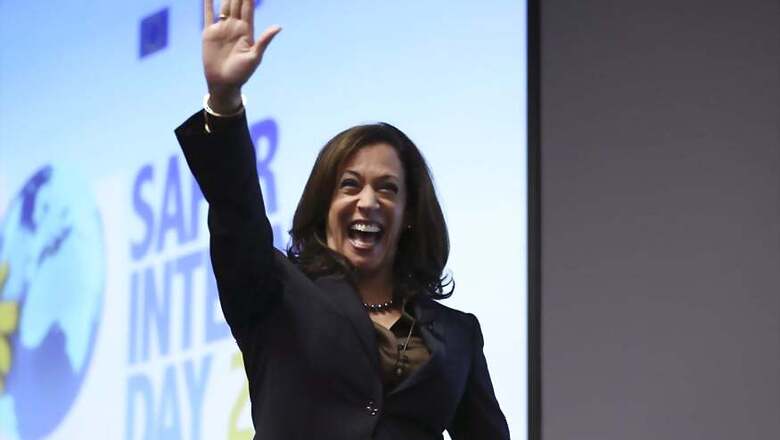
views
Washington: With not one but two new books out, coupled with a frenetic series of interviews that saw her alternately sharing a laugh, solemnly contemplating "the soul of the nation" or relating poignant memories of her immigrant parents, one could be forgiven for suspecting that Kamala Harris is about to join the Democratic field seeking the presidential nomination in 2020.
For political observers, that much is obvious — you can almost see their eyerolls — since Harris's are the classic moves of someone preparing a White House run.
"I might," she said, just a bit coyly, before bursting into contagious — and revealing — laughter in an appearance Thursday on the set of celebrated comedian and CBS television host Stephen Colbert.
The coming days should bring a more definitive answer.
But her calls for unity in her newly published memoir — "The Truths We Hold: An American Journey," from Penguin Press — clearly set the tone for what a Harris candidacy might mean in an America sorely divided by the unsettling presidency of Donald Trump.
If she does announce her candidacy, the 54-year-old California senator -- whose first name should be pronounced like "comma-la," she insists -- would be aspiring to become not only the first female president of the United States but also the first black female.
As someone who seems to personify the "American dream" and its melting-pot ideal, Harris is no novice at breaking through glass ceilings.
After two terms as district attorney of San Francisco (2004-2011), she was twice elected as attorney general of California (2011-2017), becoming not only the first woman but the first black person to serve as chief law enforcement officer of that populous state.
Then in January 2017, she took the oath of office as California's junior US senator, making her the first woman of South Asian descent (her mother is a Tamil Indian) and only the second black woman senator in American history, after Carol Moseley Braun.
Her focused and often tough-sounding lines of questioning during closely watched Senate hearings reflect her past as a prosecutor.
Harris often proudly recalls her past as a prosecutor in California when she fought big banks in the midst of the financial crisis in order to benefit families.
She casts herself as a defender of middle class families "living paycheck to paycheck" and denounces police brutality and the killing of unarmed black men.
'As though she were dumb'
The daughter of immigrants -- her father is from Jamaica -- Harris grew up in the 1960s in the progressive hotbed of Oakland, California, proud of the struggle her parents waged for civil rights.
"My mother was the strongest person I have ever known," she has written on Twitter.
Mother Shyamala was only 19 when she arrived in California in 1960 to pursue her studies, eventually becoming a renowned cancer researcher.
Harris mentions her father, Donald, as well, calling him "a respected economist" who is an emeritus professor at Stanford University.
But after her parents separated when she was about five years old, it was Kamala's mother who raised her and her younger sister, Maya, who went on to become a lawyer and an advisor to Hillary Clinton during the 2016 presidential campaign.
Hers was a happy childhood, Harris now says, where education was highly valued, and it inspired her to write her second new book, "Superheroes Are Everywhere," a children's picture book that was also published last week.
But Harris has also experienced discrimination.
"I have too many memories of my brilliant mother being treated as though she were dumb because of her accent,” she wrote in her autobiography.
Asked about that, she shared some tough words about Republican president Trump.
"There are powerful forces -- including this president -- that are attempting to vilify immigrants because they were born in another country," she said recently on CNN.
'Charismatic' and 'compelling'
But her political ascent does share one small link to that of the wealthy president: she was elected to the Senate on November 8, 2016, the day of Trump's unexpected victory.
In her book she describes the shock she felt that night, but also the stirring realization that soon followed: "We are better than this," she wrote, "but we're going to have to prove it."
Her resolutely optimistic message stands in stark contrast to the much darker landscape described by Donald Trump, who referred in his inaugural speech to "American carnage."
"It's a smart move on her part," said Dena Grayson, a Democratic strategist.
Grayson added: "She's taking a page out of the Obama playbook, which was 'hope and change,'" a message that resonated, particularly among Democrats, after the George W. Bush presidency.
Both Grayson and Jennifer Lawless, a professor of politics at the University of Virginia, see Harris as a compelling and charismatic candidate who should be well-positioned in the emerging Democratic field.
But both analysts emphasized that with that field expected to be huge and diverse -- as Democrats see a chance to run against an embattled president many of them detest -- prediction is difficult.
"The question is, is she -- and is her message -- going to break through when you have a group of 10 or 12 or 15 people running for office," Lawless said.




















Comments
0 comment